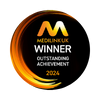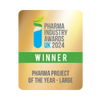Celebrating 20 years of pharmaceutical spray drying
Upperton will be celebrating its 20th anniversary on the 31st August 2019. Over this time Upperton has developed from a small consultancy business to become one of the world’s leading exponents of pharmaceutical spray drying services.
To mark this occasion, we are publishing a special two-part newsletter. In this first part Upperton’s founder and CEO Dr Richard Johnson talks about the company’s origins, what has driven the business’ success over the years and how the industry has changed.

What does the 20-year anniversary mean to you?
I have enjoyed the last 20 years immensely, running a business and planning its direction and growth is extremely rewarding. Indeed, the pharmaceutical and biotechnology industries play a pivotal role in our future health and wellbeing and as a result we have being able to work on some amazing products. Even more exciting is seeing them continue to proceed onto the market, which of course is very satisfying.
We’ve been operating successfully in the sector for 20 years and in more recent years we have been fortunate to grow hugely as a business, expanding from a couple of people in a shared office, to our own stand-alone 15,000 square foot facility with more than 25 staff. Watching this growth and evolution from a small research company to a fully-fledged CDMO staffed by some tremendously skilled people is something I’m incredibly proud of.
What have been the highlights for you?
There have been many highlights and important landmarks achieved along the way. Undoubtedly 2018 was our most successful year ever. In the space of eight months last year we doubled in size, moved into our own building and successfully passed an MHRA inspection to enable us to produce GMP batches for clinical trials. That was some going by anyone’s standards!
What has driven Upperton's success?
There are a number of things, but I think the most important are the people that work for us are our most important asset and our driver for growth. Our ability to recruit, and even more importantly, retain good scientists has enabled us to build up trust with our customers. In return, our levels of repeat business and referrals are very high such that these customers represent our main source of revenue.
Of course, our knowledge around our core technology, spray drying is in my opinion, unrivalled and it is this experience, coupled with the versatility of spray drying, that has underpinned our growth.
There’s also an appetite for change throughout the business. We’re constantly adapting and adopting new technology, and evolving in-line with customer demands and the advances in technology.
How has the CDMO sector changed?
In more recent years, spray drying has become an established formulation technology. In 1999 the technology was still establishing itself in the sector. Now it it is widely recognised as a key processing technology with a broad range of applications from relatively simple production of dry powders to enhancing bioavailability of poorly soluble drugs and particle engineering.
Back in 1999, when we first began to offer contract services, spray drying was very much a niche process in the pharmaceutical industry. These studies quite often came from larger pharma companies wanting to know whether spray drying could produce a dry powder without damaging the product and the customer would take care of all of the analytical aspects, we simply dried these formulations and shipped them for analysis.
Fast forward to 2019 and the size of client companies and the services they seek have changed considerably, particularly in the last five years or so. Today many of Upperton’s clients are small, virtual companies that quite often don’t own laboratories and employ few scientific staff. As a result, they need to outsource their full formulation development process from early feasibility to clinic. As a result the size and breadth of the projects we undertake have gradually increased in terms of the range of services needed as well as the complexity.
There are many changes that have occurred in the CDMO sector, probably the main one being the increase in both the size and number of CDMO’s that operate in the industry, which of course has grown dramatically.
The growth and consolidation the CDMO sector has in part been driven by their big Pharma clients that prefer alliances with service providers that can take them from feasibility to commercial manufacture under a single supplier agreement. In very simple terms big pharma generally began to seek their service needs from larger contract service providers, whilst Upperton’s clients became increasingly smaller!
When I look more closely at the spray drying service providers in the CDMO sector it is clear that the industry has seen significant consolidation. In particular we witnessed all of the major service providers being forced to acquire spray drying capabilities, usually by acquisition, as the demand for the technology began to increase significantly, especially over the last 3 years or so.
Now, in order to survive in the current climate, smaller CDMOs have had to become more specialised to differentiate themselves from their larger competitors such that they are seen as the “right fit” for small and virtual start-ups and offer a nimbler, highly-specialised yet flexible service.
How has your core spray drying technology and its applications changed?
The number of potential applications for spray drying has increased dramatically over the last twenty years, along with its general acceptance as a formulation technology by the pharmaceutical industry.
The broad utility and cost effectiveness of spray drying has enabled the technology evolve from what was traditionally seen as a simple drying process into a specialist formulation technology. Applications now include enhancement of bioavailability, encapsulation, particle engineering and the stabilisation of biologics alongside its traditional bulk drying capabilities. Indeed, the use of spray drying to enhance bioavailability has been a key driver for growth such that it is probably the largest application for our technology in our industry.
Spray dryings equipment has also increased in complexity with the development of dryers adapted to spray dry organic solvents, dryers capable of handling very small quantities of highly valuable products and more recently dryers that can operate under aseptic conditions.
Traditionally, Upperton has worked primarily with small molecules but in the last 5 to 6 years there has been significant growth in the use of spray drying to produce dry powder formulations containing biologics. Whilst many clients were initially reticent to subject their heat-sensitive biologics to the perceived rigours of spray drying, more and more are now seeing the advantages of spray drying as a bulk process for producing dry powders without the potential to damage even the most sensitive of products.
There has also been a resurgence of interest in using spray drying to create dry powder dosage forms for delivery by inhalation. This type of application was something of a “hot area” back when we first started but until recently interest had waned following the problems caused by the failure of a number of late-stage inhaled insulin formulations in the clinic.
What do the next 20 years bring?
Spray drying will always be at the heart of everything we do; developing our spray drying capabilities and the applications for our core technology will remain our key focus.
Having said that, Upperton is all about evolution, we continually seek to add new technologies and services to meet our customers’ demands. Indeed this expansion of capabilities will be vital if we want to achieve our growth target which is to double our turnover in the next three years. Indeed, our projections confidently predict that our current facility will reach capacity by the end of 2022 so a move to larger facilities will be very much on the cards.
In terms of core business, we aim to be world leaders in the development of next generation spray dried dosage forms and difficult to handle products. To achieve this we will be investing significant amounts of time and money on our internal R&D programmes as well as investing in staff development programmes. For us the development of our key stakeholders, our scientists, is a vital part of retaining their allegiance to our business. Our staff will continue to be our number one asset and that sets us apart from the competition.
Alongside our spray drying capabilities we will continue to invest in new technologies that we see as complementary to our core business. Indeed we have already earmarked over 0.5 million in new investment in in the next three months to enhance our dosage form development capabilities.
What new spray drying innovations do you see from Upperton for their customers in the coming years?
I have always been of the opinion that spray drying is the fastest evolving, most versatile formulation technology in the pharmaceutical industry and I envisage that this perception will continue in the next 5 to 10 years.
There are many areas that we would like to explore further; these include the spray drying and formulation of highly potent drugs and, perhaps the hardest nut of all to crack, aseptic spray drying.
We will also continue to investigate ways of improving our knowledge and control of the spray drying process itself. For example, the control of size and the size distribution of spray dried powders, an important aspect of spray drying and it is an area where there is room for further improvement.
How do you see your competitors and the wider CDMO market over the next 20 years and how will it affect Upperton?
Upperton’s key strength is its specialisation and prowess in our core technology, spray drying. We see this as pivotal and it’s what sets us apart from some of our much larger competitors. Upperton will continue to expand its formulation services, adding further downstream options and dosage form capabilities yet we will still keep spray drying at the heart of everything.
As a small, highly specialised CDMO we are able to move quickly and respond to our customers’ needs much quicker than our larger competitors. This is a key distinguishing feature and competitive advantage that we will strive to retain as we grow and evolve.
There is no doubt that consolidation in the CDMO sector will continue, but I expect that this will slow down in the coming years if it hasn’t already begun to do so. I expect that the larger industry players will pause for breath and seek to re-establish their margins after such a hectic phase of takeovers and mergers that we have seen recently.
One area where I do expect to see growth is in the formation of collaborations and partnerships between the smaller CDMO’s and other specialised contract service providers. There is a growing realisation amongst the smaller players that they can add value by working together to complement each other and in doing so offer a more streamlined service for their customers. This is something we are very keen on at Upperton and I see us doing this more and more in the coming years.





